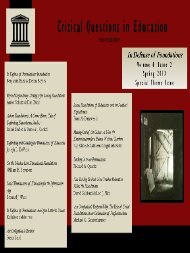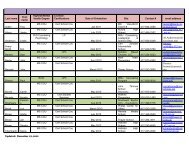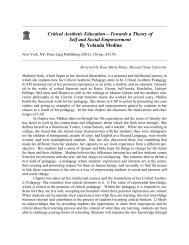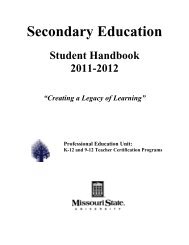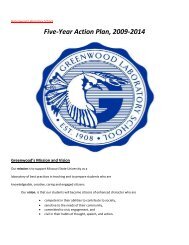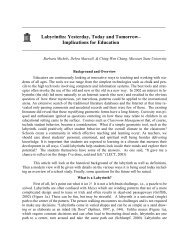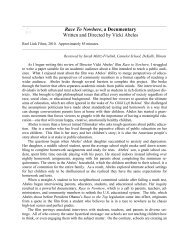An Obligation to Endure - College of Education
An Obligation to Endure - College of Education
An Obligation to Endure - College of Education
Create successful ePaper yourself
Turn your PDF publications into a flip-book with our unique Google optimized e-Paper software.
Critical Questions in <strong>Education</strong> (Special Issue) Volume 4:2 137<br />
educational foundations programs recently slated for shutdown, but have <strong>of</strong>ten wondered why<br />
educational foundations organizations have seldom applied that generally successful feminist<br />
field-stewardship strategy. Imperiled women’s studies programs have survived threats <strong>of</strong> shutdown<br />
as a result <strong>of</strong> such strategically organized in-person initiatives. But despite innovative<br />
leadership, prolific and diverse enrollments, ever-growing faculty participation and diversity,<br />
glowing local and national publicity, documentation <strong>of</strong> educational “impact” on students’ conscientious<br />
civic engagement, and well-triangulated external and internal assessment measures<br />
that indisputably justify strong support for its programmatic growth—adequate material support<br />
<strong>to</strong> sustain such programs at a level minimally sufficient <strong>to</strong> meet students’ demands for them is<br />
<strong>to</strong>o <strong>of</strong>ten still not forthcoming. Hence my own deep cynicism about obsessive assessment’s possible<br />
salvific utility, especially for fields that want their demonstrable “impact” <strong>to</strong> be learning<br />
aimed intelligently at social justice—a definitive aim for any educational foundations program<br />
worth preserving.<br />
In many locations, such impact can even be imprudent <strong>to</strong> document and broadcast. As<br />
Nussbaum has noted, “There’s no doubt that politicians have incentives that bode ill for their<br />
judgment when making decisions about higher education.” 45 Last month Indiana’s governor,<br />
who instigated major education budget cuts, left the state house <strong>to</strong> become president <strong>of</strong> Purdue<br />
University. 46 We do not yet know what his impact will be, 47 but this nationwide trend in higher<br />
education leadership—not a new phenomenon, <strong>to</strong> be sure 48 —underscores pragmatic wisdom in<br />
Nussbaum’s caveat about possible political disruptions <strong>of</strong> rationally formulated educational purposes<br />
and values. 49<br />
What field in higher education has remained un<strong>to</strong>uched by this ECC that corporatism has<br />
wrought across U.S. campuses over the past quarter century? I have even seen an article claiming<br />
that athletics programs need <strong>to</strong> rethink their purpose in these fiscally stressed times. 50 Can<br />
their big-business budgets—supporting corporate pr<strong>of</strong>it-making ventures along with men’s specta<strong>to</strong>r-sport<br />
coaches who make more and more millions each passing year and live like French<br />
kings—really be in such disarray that even they are caught up in the same terror <strong>of</strong> programmatic<br />
diminution that prompts this special issue? Educa<strong>to</strong>rs’ terror <strong>of</strong> this or that possible program cut<br />
seems <strong>to</strong> be in ever-higher, market-driven demand these days. A few highly visible, well-<br />
45. Nussbaum, Not for Pr<strong>of</strong>it, 147.<br />
46. Nick DeSantis, “Purdue Picks Indiana Governor as Next President,” Chronicle <strong>of</strong> Higher <strong>Education</strong> (June 21, 2012):<br />
http://chronicle.com/blogs/ticker/purdue-picks-indianas-governor-as-next-president/44701.<br />
47. Helpful impact is sometimes possible in such situations. For example, David Boren, a former governor and U.S. sena<strong>to</strong>r,<br />
also a Rhodes Scholar, has provided politically savvy, economically resourceful, his<strong>to</strong>rically conscious presidential leadership for<br />
preservation and development <strong>of</strong> intellectual and aesthetic culture at the University <strong>of</strong> Oklahoma.<br />
48. Lamar Alexander made a similar move in Tennessee, from governor <strong>to</strong> university president in 1988, before becoming<br />
U.S. Secretary <strong>of</strong> <strong>Education</strong> and U.S. Sena<strong>to</strong>r: http://<strong>to</strong>pics.nytimes.com/<strong>to</strong>pics/reference/times<strong>to</strong>pics/people/a/lamar_ alexander/index.html.<br />
49. My own dean at the University <strong>of</strong> Oklahoma, Gregg A. Garn, understands this phenomenon, having written a master’s<br />
thesis in educational foundations at Arizona State University, “The Influence <strong>of</strong> Politics on Charter School Reform in Arizona”<br />
(1996), which concluded Arizona legisla<strong>to</strong>rs had passed charter school reform based on political rhe<strong>to</strong>ric rather than empirical<br />
evidence.<br />
50. Brad Wolver<strong>to</strong>n, “In Time <strong>of</strong> Austerity, Athletics Programs Need a Reset,” Chronicle <strong>of</strong> Higher <strong>Education</strong>, January 27,<br />
2013: http://chronicle.com/blogs/players/in-austere-times-athletics-programs-need-a-reset/32403. Of course, athletics programs<br />
should be rethinking their purpose: DUH! When have you ever heard <strong>of</strong> an athletics program in higher education focused primarily<br />
on educating all students in and about diverse world physical cultures, including their traditions <strong>of</strong> training and practice in<br />
somatic arts and disciplines as well as games and sports, which might foster continuing intelligent activity for health, agility,<br />
strength, mindfulness, and grace in daily life throughout adulthood? <strong>Education</strong>al foundations scholars could help athletics programs<br />
rethink their educational purposes—brilliantly. See, for example, Richard Shusterman, Thinking Through the Body: Essays<br />
in Somaesthetics (New York: Cambridge University Press, 2012); Richard Shusterman, Body Consciousness: A Philosophy<br />
<strong>of</strong> Mindfulness and Somaesthetics (New York: Cambridge University Press, 2008).



